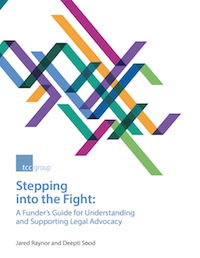Four Questions Funders Should Ask About Legal Advocacy
Resource type: News
TCC Group | [ View Original Source (opens in new window) ]
Legal advocacy – also known as advocacy through the courts – uses the judicial system to advance social change goals.
This is often done by bringing forward a legal case in court that focuses on improving a situation for a particular group of disadvantaged people. Brown v. Board of Education — which kick-started the school desegregation movement — is a classic example of legal advocacy. The case argued that separate schools were inherently unequal in an era when legislation on school integration was unlikely to change.
Should my foundation fund legal advocacy?
Funders interested in supporting legal advocacy should ask themselves four questions:
- Is the legal environment the appropriate arena for moving this change forward? Have non-legal strategies been tried? Have the necessary legal precursors been met?
- Is the advocacy environment ready to take on this issue? Are advocates ready to use strategies to complement legal advocacy such as public awareness and education, media relations, grassroots organizing, and legislative advocacy?
- What aspects of legal advocacy need support? Do advocates need funding to conduct preliminary research on a case, to bring on more counsel, to build partnerships with the community, or something entirely different?
- Does legal advocacy fit within my foundation’s strategy? Are issues we care about likely to be impacted? How will legal advocacy work complement or harm our other work? Does my foundation have a clear vision for supporting this work?
Philanthropic staff we spoke to stressed that a legal background was not necessary to make these grants. Any program officer who has experience working with advocacy groups and coalitions and who is willing to ask thoughtful questions and listen for how the legal strategy connects with non-legal strategies, is suited to make a grant for legal advocacy work.
How can my foundation support legal advocacy?
Funders are sometimes leery of getting involved in the complexities and perceived cost of legal advocacy; however, there are a number of ways for funders to effectively support legal advocacy. These include:
- Building the capacity of legal advocacy organizations or the capacity of other advocacy organizations to partner with legal advocacy organizations
- Funding legal advocates researching an issue
- Facilitating relationships between legal advocates and others, such as non-legal advocates and community organizers
- Supporting communications or media relations, including testing of messages Supporting various phases of litigation including initial filing, appeals, and bringing on expert witnesses
- Supporting implementation of a legal change
Learn more
 Stepping Into the Fight: A Funder’s Guide to Understanding and Supporting Legal Advocacy introduces funders to the concept of legal advocacy, suggests questions funders should ask themselves to know if their foundation is ready to fund legal advocacy, and outlines how to best support this work.
Stepping Into the Fight: A Funder’s Guide to Understanding and Supporting Legal Advocacy introduces funders to the concept of legal advocacy, suggests questions funders should ask themselves to know if their foundation is ready to fund legal advocacy, and outlines how to best support this work.
This short video, featuring Annmarie Benedict, Atlantic’s Senior Program Executive & Director of Grants Monitoring, and Stephen McConnell of the Civic Participation Action Fund, examines how advocacy organizations use legal advocacy as a strategy and how funders can best support that work.
TCC Group is an Atlantic grantee. Atlantic commissioned this report.